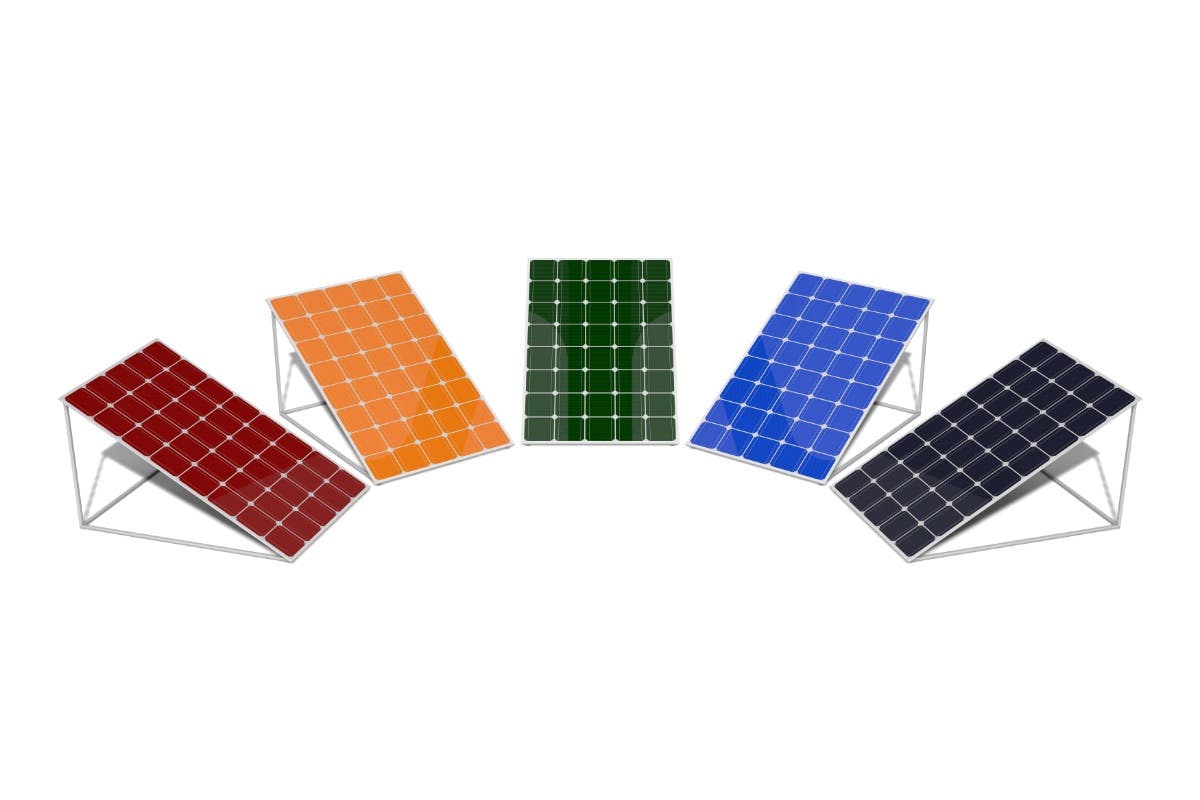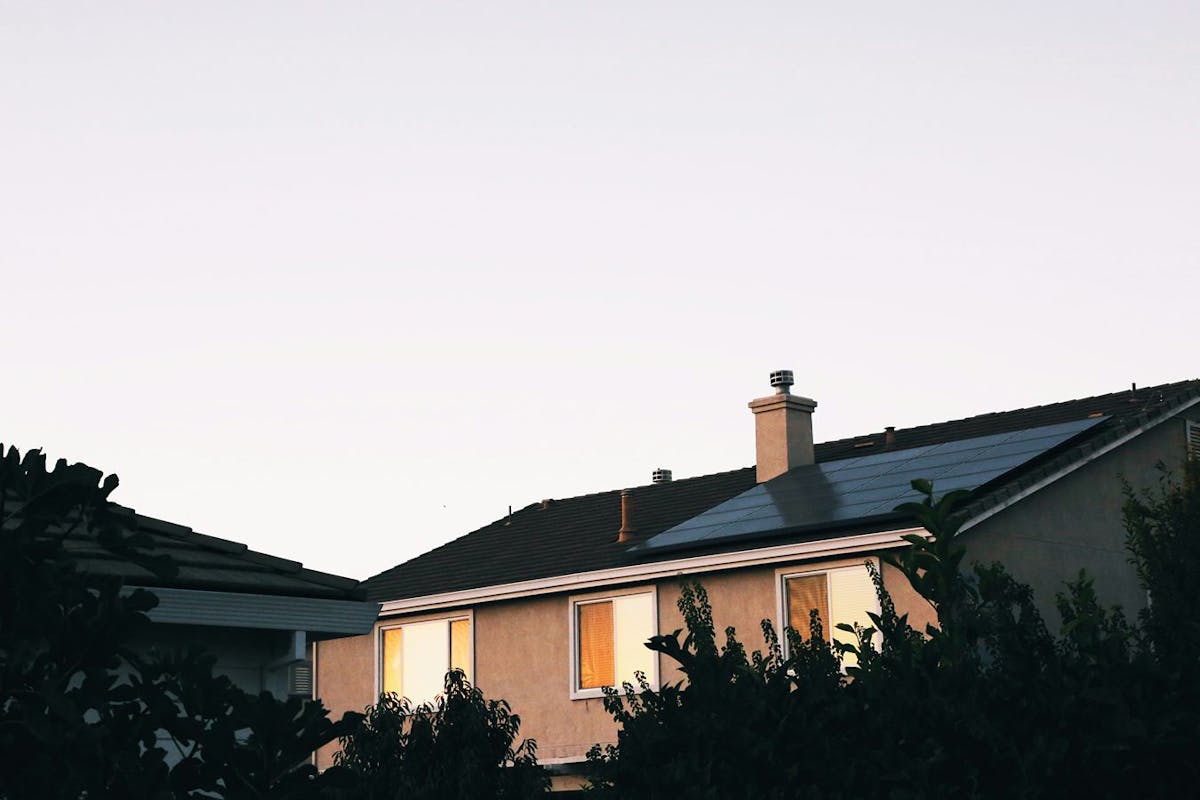Colored Solar Panels: Are Black and Blue the Only Options?
Last edited
Author
Cory O'Brien
Senior Director - Growth Marketing
Editor
Ryan Barnett
SVP, Policy & New Market Development

If you look at the majority of rooftop solar panels, you might assume that solar panels come in just two colors: black and blue. If those two colors don’t fit with your personal aesthetic, or your HOA has certain rules about roof colors, the absence of options for colored solar panels might limit your interest in installing solar power. You might be tempted to wait and see if other colors become available, especially after seeing options like Tesla’s initial Solar Roof tile designs.
However, there are specific reasons that solar panels aren’t widely available in different colors. The technology is slowly improving, and a wider range of colors may soon be available to people interested in investing in home solar, but it’s important to understand the challenges behind colored solar panels, and what options might be available in the future.
See how much you can save by going solar with Palmetto
Do Solar Panels Come in Different Colors?
The short answer is: Yes, residential solar panels are available in a variety of colors.
The long answer is much more complicated, and you can’t just order different color solar panels to match your home. In general, colored panels are more expensive and generate less power. As a result, they’re often made by smaller, specialty manufacturers. Currently, if a commercial solar panel manufacturer wants to make solar panel colors other than blue and black, they have to use dyes or coatings, which make the panels less efficient.
Solar installers themselves are also less willing to purchase these panels. The vast majority of customers choose solar to lower their energy costs, so they don’t want fancy solar panels that cost more and work less effectively just because they might be a different color.
Thus, it’s cost-prohibitive for a solar energy company to make colored solar panels available just in case a single customer wants them. Additionally, it saves the company money to only purchase one or two types of solar panels from their preferred solar manufacturer, as they can pay less by buying in bulk.
Why are Most Solar Panels Black and Blue?
You may be surprised to learn that the color of solar panels is not just an aesthetic choice by the manufacturers. Solar panels are black and blue because those are the natural colors that silicon becomes during the manufacturing process. There are two primary kinds of solar panels commercially available: Monocrystalline and Polycrystalline.
Monocrystalline Solar Panels are Black
Monocrystalline solar cells are made out of silicon where each solar cell is a single crystal. This makes them considerably more efficient, especially since black as a color is more light-absorbent than the blue color. As costs come down across the industry, most newer solar panel installations use these black monocrystalline panels because people want the increased efficiency they provide.
Polycrystalline Solar Panels are Blue
Blue solar panels are made from polycrystalline silicon where a single cell contains several silicon crystals, and the way those crystals interact with sunlight makes them appear blue. The multiple crystals slow conduction, resulting in blue polycrystalline solar cells being less efficient in generating electricity. Polycrystalline technology used to be cheaper than monocrystalline, which is why you are more likely to see blue panels in older installations.
For more information, check out our article, Black vs Blue Solar Panels: What’s the Difference?
See how much you can save by going solar with Palmetto
Can Solar Panels Be Different Colors?
We mentioned dyes and coatings earlier, and they can certainly be used to change the color of solar panels. However, dyes and coatings also dramatically reduce panel efficiency. In fact, colored solar panels created with this method are as much as 45% less efficient than the standard blue or black solar panels. That can slow down any return on investment you experience with your solar PV system, especially since these panels are more expensive to begin with.
However, a variety of new technologies are being experimented with to create more efficient colored panels, and a wider range of colors to suit more environments, color schemes, and aesthetics. For example, researchers in the Netherlands have developed a soft-print lithography technique that allows panels to reflect a specific color. Unfortunately, this still reduces efficiency, but only by about 10% compared to the 45% of other coating methods. With continued improvement, they aim to reduce that loss in efficiency to as little as 2%.
So, while we don't have solar panels in all the colors of the rainbow available yet, the technology is definitely being worked on.
Does the Tesla Solar Roof Offer Colored Solar Panels?
In 2017, Tesla announced they would release four styles of Solar Roof, which would basically be photovoltaic panels designed to look like regular roof tiles. The advertised options were smooth glass, textured glass, French slate, and Tuscan. This quickly led to rumors that Tesla had cracked the code for creating efficient colored solar panels, and homeowners assumed they’d soon be able to order solar panels in a wide variety of colors and styles to match their roof type.

However, the Tesla Solar Roof tiles that made it to market are currently available only in blue, dark blue, and black, and lack the texture and shapes that Elon Musk originally promised. The Tesla website gives no mention of solar roof tiles in other colors or textures, or of them being available in the future, and their solar panels are also only available in black.
As the technology improves, it’s possible that Tesla will start offering solar roof tiles in other colors, but they simply don’t do so at this time. However, solar roofs still have some aesthetic advantages for those who can afford the higher price tag.
Can You Get Colored Solar Panels?
Yes, you do have options for installing colored solar panels on your roof. However, the current commercially available technology is significantly less efficient and more expensive than black and blue solar panels, and you’ll likely need to work with a specialized installer to get them ordered and installed.
Dyes and coatings don't handle tough conditions well, so it’s likely that colored panels will eventually lose their vibrance over a panel’s 25-year lifespan. Thus, this aesthetic improvement isn’t worth the lost efficiency and greater cost for the average homeowner
Most solar panels are black or blue as a result of how the silicon is created during the manufacturing process. Moreover, manufacturers, installers, and the majority of customers are focused on efficiency, so installers are often reluctant to work with the current version of colored solar panels because of the lower efficiency issues and higher costs. You’d need to find an installer willing to work with you at the design phase to create a PV system that uses those lower-efficiency panels and still creates the most power possible.
However, technology is improving all the time, and there are companies working on more efficient colored panels. If you have your heart set on colors that match the aesthetics of your home, roof, or neighborhood, you should keep an eye out for new panels that increase the range of available colors and reduce the efficiency loss.
If you don’t want to wait, and you’re ready to install a solar power system on your home and start saving money, talk to Palmetto today. We will work with you from the design phase through installation, and provide long-term maintenance to ensure that you get a solar power system that works for you, and will give you the maximum amount of energy your home needs.
Get started with our free Solar Design Tool and see how much you could lower your electricity bill by choosing solar energy.


